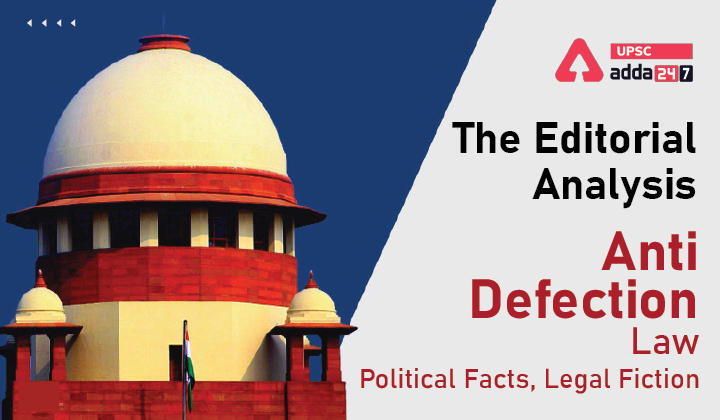Table of Contents
Anti-Defection Law- Relevance for UPSC Exam
Anti-Defection Law: Anti-Defection Law is mechanism to use disqualify MPs/MLAs who act against their official party line. Anti-Defection Law is part of UPSC Mains GS Paper 2 (Indian Constitution- Parliament and State Legislatures – structure, functioning, conduct of business, powers & privileges and issues arising out of these.)
Anti-Defection Law in News
- The political crisis in Maharashtra, and many others before it, are grim reminders of what the Tenth Schedule can and cannot do.
- The practice of legislators from changing political parties during their term continues unabated in Indian legislatures despite the Tenth Schedule having been inserted into the Constitution in 1985.
Anti-Defection Law in India
- Tenth Schedule: 52nd Constitutional Amendment Act added a new Tenth Schedule containing the details regarding Anti-defection law. Tenth Schedule allows for disqualification of an elected member of a House-
- If such member belonging to any political party has voluntarily given up membership of their party, or
- If they vote in the House against such party’s whip.
- 91st Constitutional Amendment Act, 2003: It provided that If two-thirds of the members agree to a merger with another party, they will not be disqualified.
- It removed the exemption from disqualification if one-third of the members form a separate group (the rule prior to the amendment).
- Disqualifying Authority: Speaker of the State Legislative Assembly is the final authority when it comes to disqualifying a member under Anti-defection law.
Merger Provisions under Tenth Schedule of the Constitution
- Paragraph 4 of Tenth Schedule is spread across two sub-paragraphs. A conjoint reading of which suggests that a merger can take place only when-
- An original party merges with another political party, and
- At least two-thirds of the members of the legislature party have agreed to this merger.
- It is only when these two conditions are satisfied that a group of elected members can claim exemption from disqualification on grounds of merger.
- Need for Merger Exception: The merger exception was created-
- To save instances of the principled coming together of political groups from disqualification under the anti-defection law, and
- To strike a compromise between the right of dissent and party discipline.
Concerns with Tenth Schedule
- Vague Provisions: creates a “legal fiction” so as to indicate that a merger of two-third members of a legislature party can be deemed to be a merger of political parties, even if there is no actual merger of the original political party with another party.
- Against Small Parties: Defection gets easier in smaller legislative assemblies, where even a sole member can account for two-thirds of the legislature party’s strength to cross the floor without attracting disqualification.
- Against Individual Freedom: Presently, while individual Members of Legislative Assemblies remain vulnerable to disqualification for crossing the floor, group defections remain exempt.
Conclusion
- Legal fiction created by paragraph 4 of tenth schedule should be deleted as suggested by the Law Commission in 1999 and the National Commission to Review the Working of the Constitution ((NCRWC) in 2002.
- Till that happens, an academic revisiting of the Tenth Schedule by the Supreme Court, so as to guide future use of the anti-defection law, is timely and should happen soon. That would do a world of good for democracy in India.
Read current affairs for UPSC




 TSPSC Group 1 Question Paper 2024, Downl...
TSPSC Group 1 Question Paper 2024, Downl...
 TSPSC Group 1 Answer key 2024 Out, Downl...
TSPSC Group 1 Answer key 2024 Out, Downl...
 UPSC Prelims 2024 Question Paper, Downlo...
UPSC Prelims 2024 Question Paper, Downlo...




